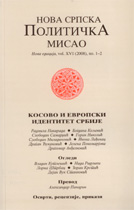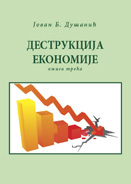| NSPM in English | |||
Goodbye to Europe as a high-ranking power |
 |
 |
 |
| понедељак, 17. мај 2010. | |
|
(The Financial Times, May 13, 2010)
In part this development reflects Europe’s success. While Europe was the central arena for much of 20th- century history and a principal theatre for both world wars and the cold war, it now is mostly at peace. The Franco-German rift has been replaced by a broader integration of the continent inside the European Union, with France and Germany at its core. Europe is to a large extent whole and free. What happens within it will not determine the arc of the 21st century. But Europe’s loss of centrality also reflects its failings. The European project is foundering. Greece is the most pronounced problem, one brought about by its own profligacy and a weak EU leadership that permitted it to live beyond its means and violate the terms under which the euro was established. But the crisis was made worse by German dithering, and initially timid responses from European institutions and governments. The euro could be one of the casualties. Already there are signs the crisis is spreading to other countries that, having also lived beyond their means, are suffering from insolvency but are unable to do much about it given their domestic politics and membership of the euro. This week’s €750bn rescue package will buy time, but will not address the insolvency at the core of the problem. Europe’s recovery will be anaemic in absolute and relative terms. Europe is now the world’s largest economy, slightly larger than the US, but will not be for long. Even before this economic crisis, Europe was weakened by a political crisis. Many Europeans have been preoccupied with revising European institutions, but repeated rejections of the Lisbon treaty demonstrate that a united Europe no longer captures the imagination of many of its residents. Lacklustre leadership of European organisations is both a cause and a result of this loss of momentum. Behind this drift is the stark reality that Europeans have never quite committed to Europe, largely because of the continued pull of nationalism. If Europeans were serious about being a major power, they would trade the British and French United Nations Security Council seats for a European one. This is not about to happen. Europe’s drift also manifests itself militarily. Few European states are willing to devote even 2 per cent of their budgets to defence; and what they spend their money on makes little sense. National politics and economics dictate expenditures, so there is much replication of what is not relevant and little investment in what is needed. The whole is less than the sum of its parts. Afghanistan is a case in point. The European contribution there is substantial, with more than 30,000 soldiers from EU countries. But the involvement is uneven, with nearly a third of the troops coming from the UK. In many cases the roles are diluted by governmental “caveats” that limit missions, a lack of equipment and commitments of uncertain duration. European political culture has evolved in ways that make it harder to field militaries willing to bear the cost in blood; the US secretary of defence describes this as “the demilitarisation of Europe – where large swaths of the general public and political class are averse to military force and the risks that go with it”. All this limits Nato’s future role, as Nato mostly makes sense as an expeditionary force in an unstable world, not as a standing army on a stable continent. Time and demographics will not improve the situation. Europe’s population has levelled off at about 500m and is rapidly ageing. By mid-century the percentage of Europe’s adults who are older than 65 is projected to double. Fewer will be of military age; a smaller number will be working to support the retired. History is at work here as well. US-European ties and Nato were destined to become weaker given the end of the cold war. Alliances tend to be created and to thrive in eras of predictability and consensus over threats and obligations. The post-cold war, post-9/11 world is much more fluid than this. The combination of structural economic flaws, political parochialism and military limits will accelerate this transatlantic drift. A weaker Europe will possess a smaller voice and role. Nato will no longer be the default partner for American foreign policy. Instead, the US will forge coalitions of the willing to deal with specific challenges. These clusters will sometimes include European countries, but rarely, if ever, will the US look to either Nato or the EU as a whole. Even before it began, Europe’s moment as a major world power in the 21st century looks to be over. Richard Haass is president of the Council on Foreign Relations and author of ‘War of Necessity, War of Choice: A Memoir of Two Iraq Wars’ |
Од истог аутора
Остали чланци у рубрици
- Playing With Fire in Ukraine
- Kosovo as a res extra commercium and the alchemy of colonization
- The Balkans XX years after NATO aggression: the case of the Republic of Srpska – past, present and future
- Из архиве - Remarks Before the Foreign Affairs Committee of the European Parliament
- Dysfunction in the Balkans - Can the Post-Yugoslav Settlement Survive?
- Serbia’s latest would-be savior is a modernizer, a strongman - or both
- Why the Ukraine Crisis Is the West’s Fault
- The Ghosts of World War I Circle over Ukraine
- Nato's action plan in Ukraine is right out of Dr Strangelove
- Why Yanukovych Said No to Europe

.jpg)








 It is more than a little ironic that Nato has committed itself to defining a new strategic concept at precisely the moment the transatlantic relationship counts for less than at any time since the 1930s.
It is more than a little ironic that Nato has committed itself to defining a new strategic concept at precisely the moment the transatlantic relationship counts for less than at any time since the 1930s.












